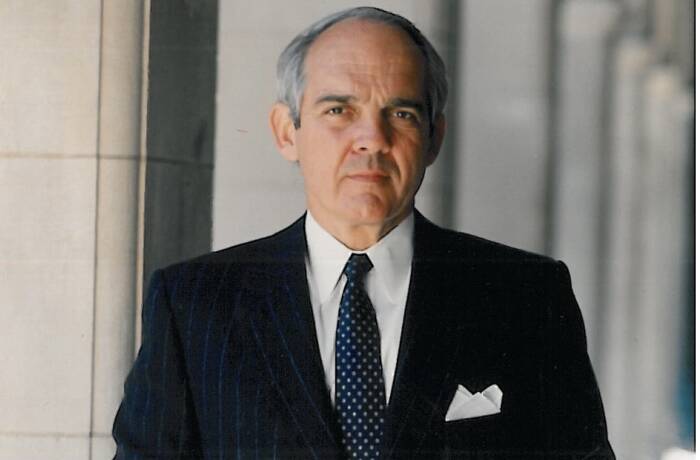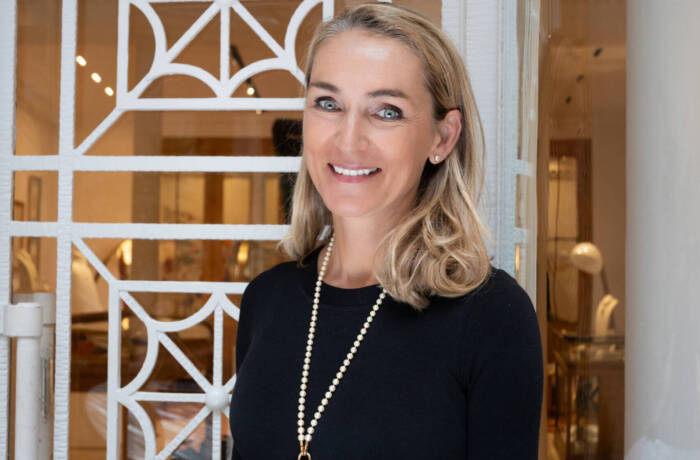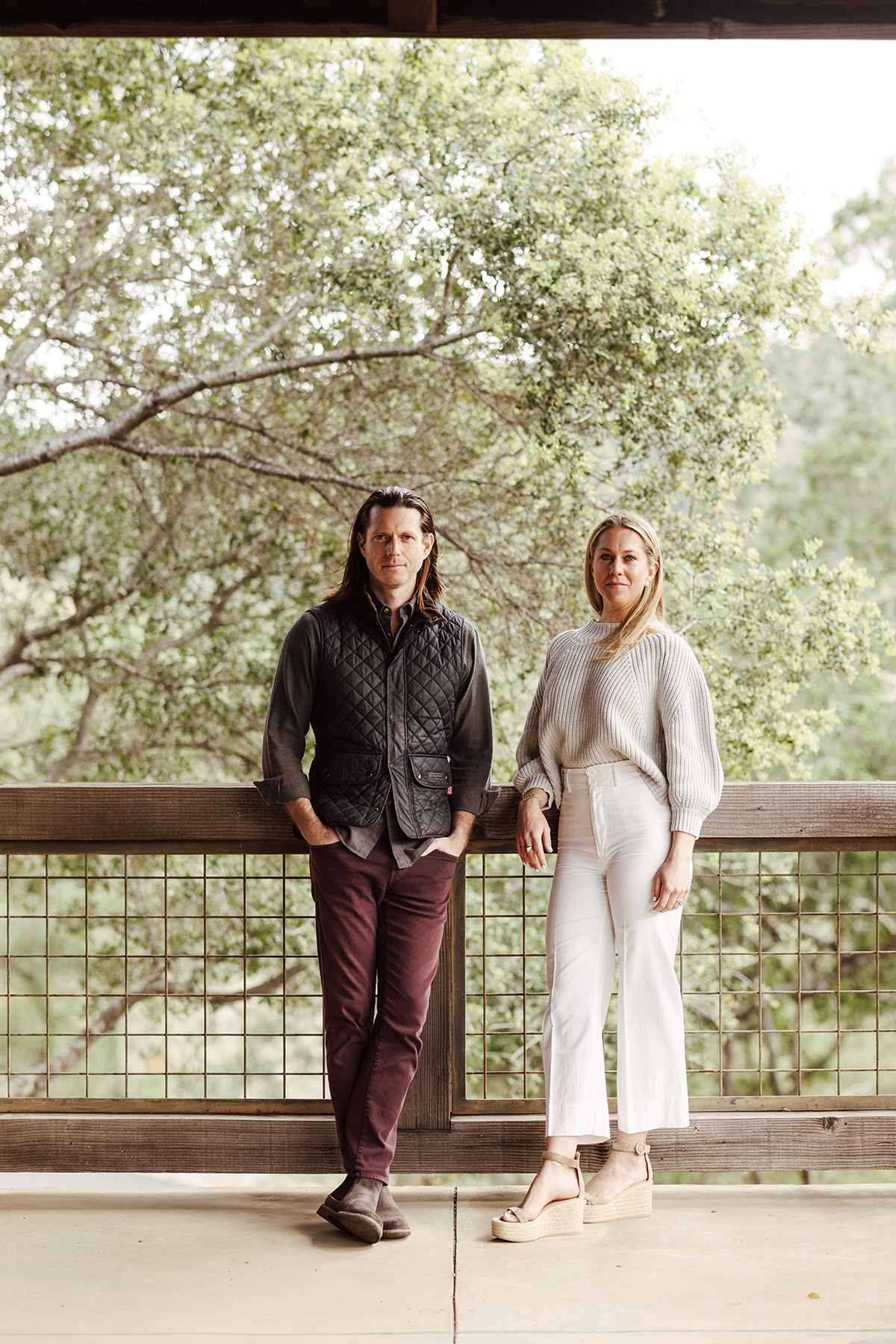
Will and Amanda Harlan
Will and Amanda Harlan have taken over an American icon. The siblings are now running Harlan Estate, the legendary wine estate created by their father Bill Harlan, who famously set out in the 1980s to prove that America could create the equivalent of a Chateau Lafite. Included in the family’s holdings are two other top-end California wine estates, a luxury resort, and one of the world’s most exclusive private members’ clubs. Darius Sanai speaks with the new generation about succession, family harmony, and plans for the next 200 years
Chatting with Will and Amanda Harlan, you wouldn’t think they were royalty. Will, Amanda’s elder brother, is thoughtful, gentle in his mannerisms, philosophical but focussed in his thinking. Amanda is, ostensibly, more outgoing, more cheery and chatty, although plainly her social vibe hides plenty of deep intent – she was, earlier in life, a professional dressage rider who won gold and silver at the junior OIympics.
And although neither Will nor Amanda are actually royals, even in a my-great-uncle-was-a-Hapsburg, European extended way, they are royalty in an important sense. Their father, Bill Harlan, founded Harlan Estate in Napa Valley in 1984. A real estate developer (among other things), Harlan Senior set out to create a wine estate near California’s Pacific Coast that would rival the great names of France – Château Lafite, Cheval Blanc, Romanée-Conti – for both quality and reputation.
Harlan set himself a monumental task, but achieved it remarkably quickly. His fourth vintage was rated a perfect 100/100 by the uber-wine critic Robert Parker; his British counterpart Jancis Robinson of the Financial Times labelled Harlan one of the ten best wines of the 20th century. Harlan Estate then rode on a wave, partly of its own making, of enthusiasm and glamour for the top wines of California. The wave was fuelled by the 1990s dot com boom that minted thousands of new millionaires in the area: if your home was in Pacific Heights, why would you only champion wines from across the world in France?
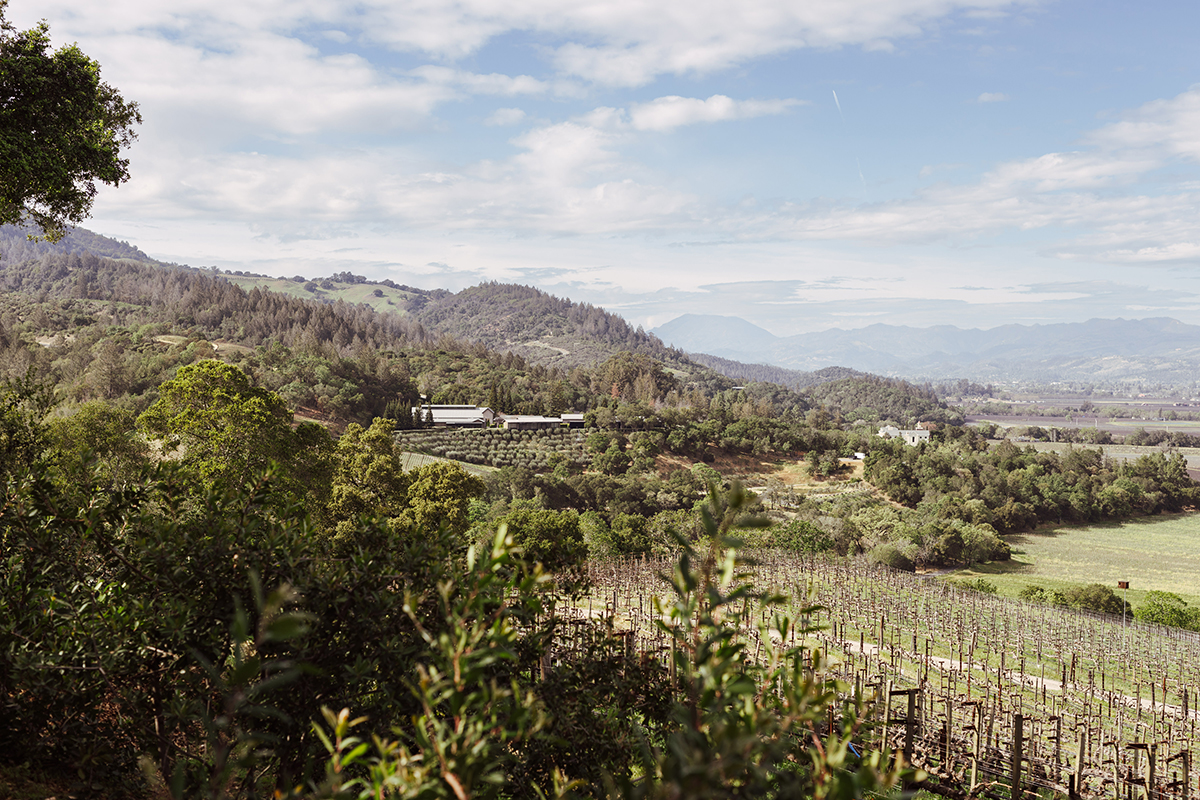
Harlan Estate is on the west side of the fabled Napa Valley
Harlan Estate rapidly became a near-mythical wine, family owned, hard and very expensive to get, desire and scarcity fuelling each other. Part of it was a lust for the new, among the newly rich, that created the contemporary art boom of the era that has never stopped since; part of it was that Bill Harlan made exceptionally good wine, a true match for the great names of the old world, in a style that was more rich and less bitter than a classic Bordeaux. Harlan Estate was a top-level wine that didn’t need an instruction manual to be properly appreciated.
Harlan Snr contributed to his revered status by announcing a 200 year plan for the estate, to gain a long-term reputation equal to the world’s greatest chateaux. Napa Valley was turning from a beautiful area, between two mountain ranges, with some wine farms, to some of the most desirable real estate in the US. The area’s private members’ club, Napa Valley Reserve, part-owned by the Harlans, is one of the most exclusive in the world, with a $165,000 entry fee. Billionaires are left on waiting lists for the top Napa wines, led by Harlan and other names like Screaming Eagle.
Follow LUX on Instagram: luxthemagazine
I first met Bill Harlan and his wife Deborah at an event in France in 2015. The division I headed at Condé Nast had just been asked to take over a wine and luxury magazine run by a Hong Kong wine writer, and the Harlans, along with other celebrated names in wine, were at the publication’s lavish launch party. They were incisive, distinguished, curious.
I then spent some time with Will and Amanda in Napa in early 2022. It was wintertime, but the ongoing drought and days of blue sky and uninterrupted sunshine made for a spectacular backdrop as we toured the Howard Backen-designed buildings and high vineyards, bordering forests, at Promontory. Promontory is another of the family’s properties: situated on a mountaintop separating Napa with neighbouring Sonoma, much of it is wild woodland, interspersed with vines, making wines with a cool, stony complexity.
We also visited Bond, another property of the family, another intellectual project, this time with the aim of making distinctive Cabernet Sauvignon out of single vineyards chosen to be distinctive. While much of the Harlan vision is inspired by Bordeaux, Bond has a vision rooted in Burgundy, where individual vineyards, and even areas within vineyards, are identified as the best of the best.
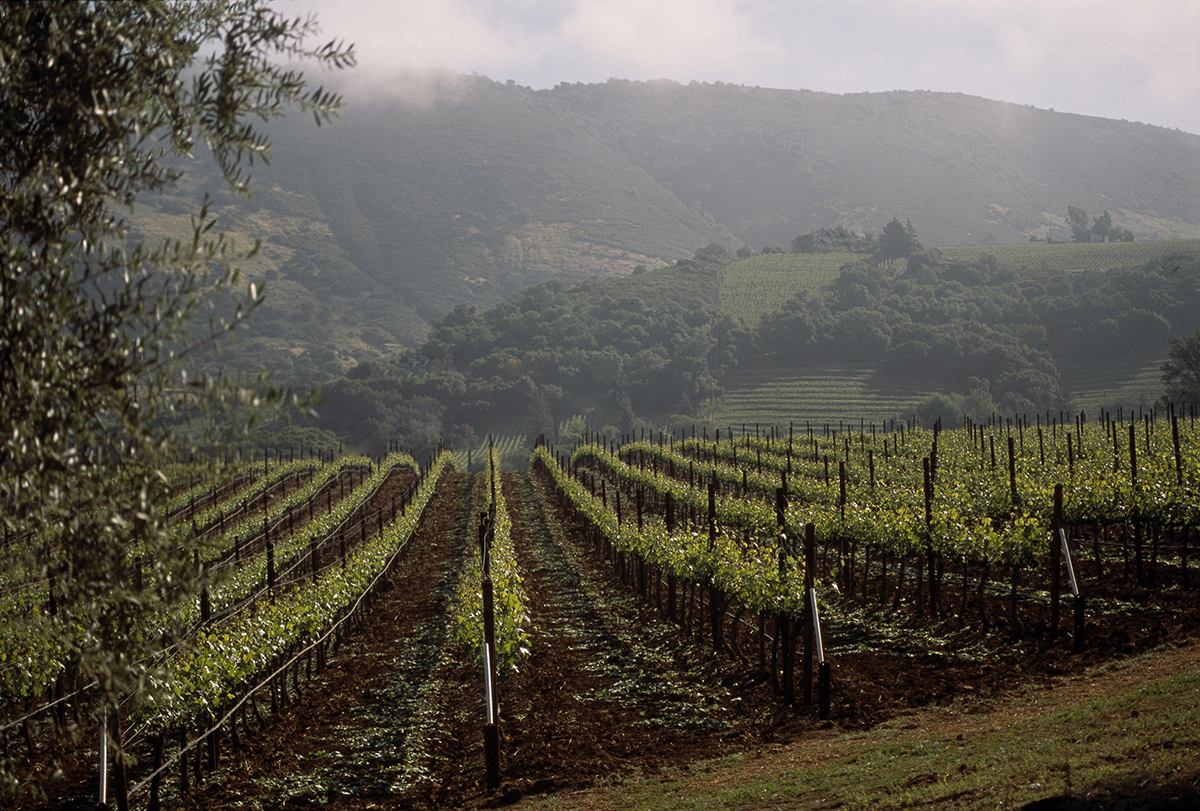
St Eden Vineyard
And we tasted The Mascot, the brainchild of Will: a wine they would hesitate to call entry level, as the price of a bottle is more than a meal for four in a family restaurant in Europe, but which is aimed to be more accessible, both in terms of price and style. The Mascot’s raison d’être is that it is made from younger vines of all three properties (Harlan Estate, BOND, and Promontory). Initially, it was a blend made for the family table, but Will and Amanda convinced their father and the winemakers to let them offer it on its own. The Mascot is a delicious red wine that is both fresh and deep: a more playful Miu Miu to Harlan Estate’s architectural Prada.
One of the most striking aspects of the trip was a visit to the Napa Valley Reserve. This is part super-exclusive wine estate, part hyper-exclusive members’ club, on the eastern side of Napa Valley with views of the Mayacamas Mountains. Members pay very high fees to join, and as well as access to some quite sublime restaurants and spaces, they get to create their very own blend of top-level Napa wines.
I was amazed so little has been made of Napa Valley Reserve globally – a similar club in France or Tuscany would have attracted reams of magazine pages and petabytes of digital coverage, and would have hosted numerous fashion shoots and art shows. But royalty is discreet. Too discreet, I wondered, as I wandered around, thinking idly of who might create something at a similar level in Europe. Bernard Arnault of LVMH would make it a Cheval Blanc and commodify it. François Pinault of Kering has the pedigree in Chateau Latour (and Christie’s) but no hospitality experience. Michel Reybier of La Reserve group? Soho House? Sharan and Eiesha Pasricha of Maison Estelle?
Finally, I caught up with Will and Amanda together, over Zoom, to speak about succession and what it feels like taking over such a carefully assembled portfolio of estates and properties – the family also own Meadowood, a luxury hotel resort in a wooded valley on the edge of Napa – with a view to the next 200 years.
Will, ever thoughtful, sometimes philosophical, never predictable, tended to take the lead, as elder sibling and managing director. Amanda, with a smile in her voice, would defer but sometimes come in and make her point, enthusiastically and with an articulacy and economy of words.
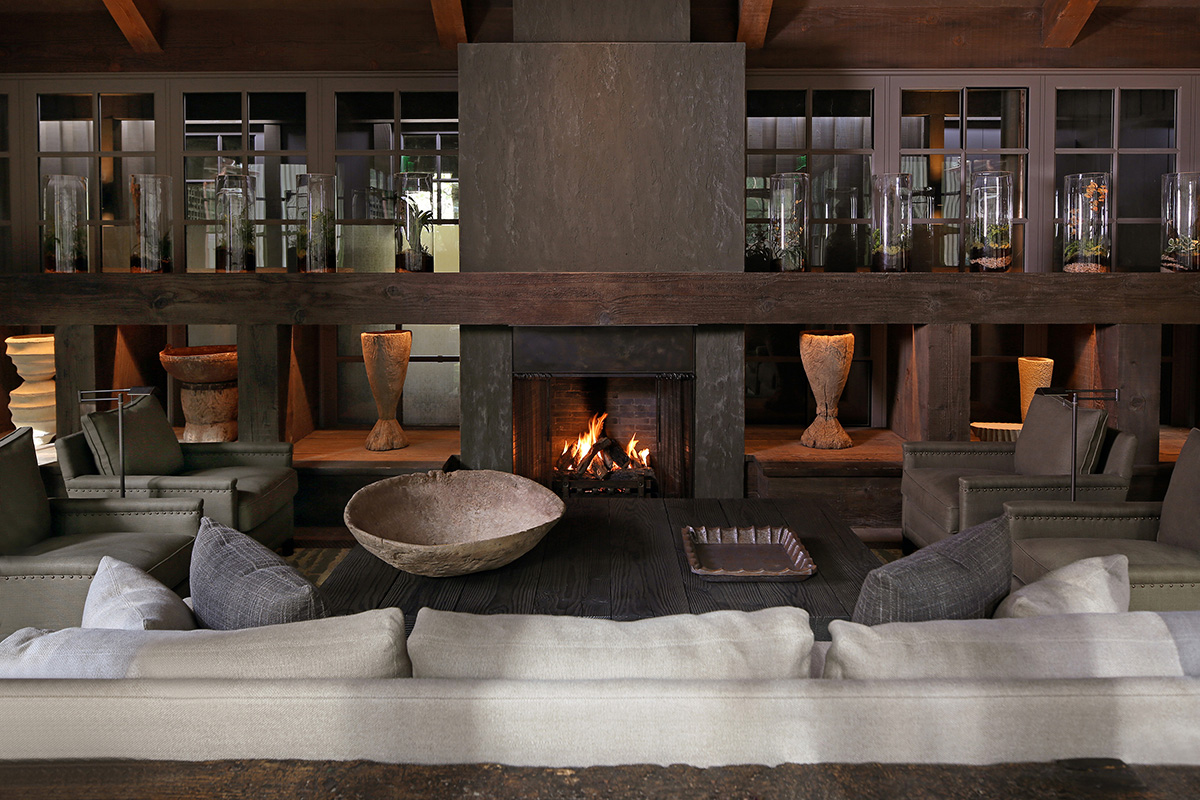
The spa at Meadowood, the family’s luxury resort on the east side of Napa Valley
The impression was of the next generation, in a family succession, taking over from a powerful and charismatic father, who are taking the reins thoughtfully, respectfully, and with the same determination shown by their parents: and with the confidence to do what they wish, within the context of a 200 year plan.
LUX: What is it like to be part of a succession?
Will Harlan: That’s not a word we have internally used, but it is a succession at the end of the day. And this transition of generations, I think the most important word we find ourselves using is continuity. Being able to provide that structure and environment in which we can pass along the most amount of experience and wisdom and everything from the previous generations, not just of the family but of the team as well, so I think we find ourselves thinking more in terms of continuity.
LUX: Taking over a family business, do you ever feel daunted, ask yourself, what if I mess it up?
WH: I mean, there’s always going to be an element of that and I think it’s important to have an element of that, because without feeling that it’s daunting you might be missing, first of all just how much potential there, is, and I think you’d be missing a certain aspect of humility, and without that I don’t think you’re open minded enough to grow and continue to improve and evolve. As Amanda says, we’ve been doing this for a little bit and my learning curve feels vertical, it feels like we’ve been drinking from a fire hose, for me, a little over ten years and it doesn’t seem like the fire hose is turning off any time soon. So, there’s that element, but at the same time, I’m now building up a bank of things that I’ve now gotten the hang of, and some familiarity, enough that there is a little more balance between the comfort and discomfort of the daunting nature of the role.
Amanda Harlan: I was going to say, Will is a couple years ahead of me and I think in a very different way has been working very closely alongside my father, there was a very crucial passing of the baton the last few years, and on the visionary, philosophical side, has been a lot closer to it than I have. The first five or six years of my joining the business, I was out in the market, so for me, I think it was very exciting and maybe the daunting part is just setting in a little bit. But I do have to say, maybe along with the inevitable rollercoaster of emotion that comes day to day, I’d say the most exciting and maybe solid part for me is that I’m not doing it alone, and that I have my brother and Cory [Empting, Managing Director of Wine-growing] and a really solid team around us, that is arm in arm with us as we climb this proverbial mountain. But I can’t speak for my brother.
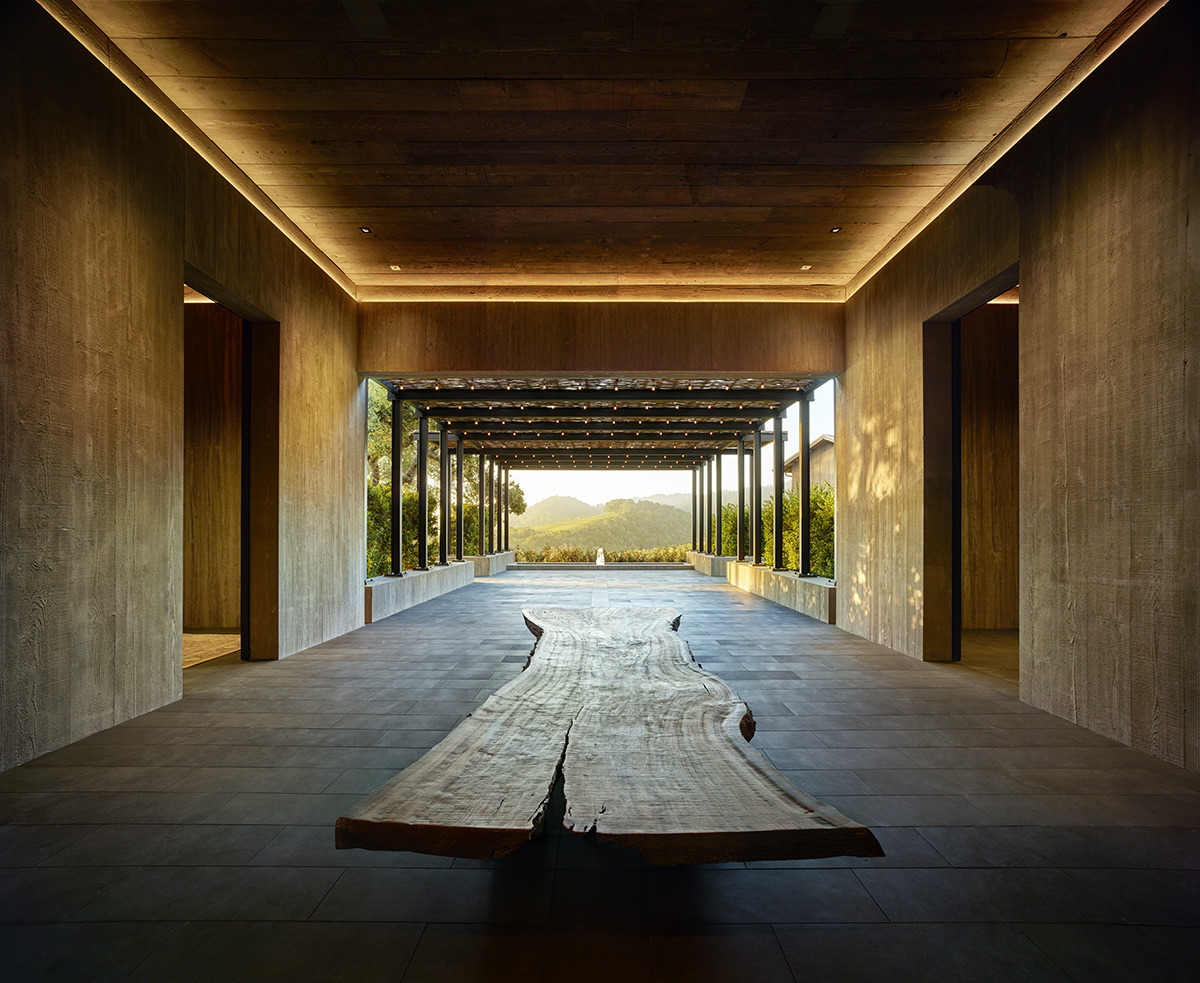
Promontory, the Harlan family’s newest property, has a winery designed by Howard Backen with long, organic sightlines
LUX: What are hardest things that you have to do day-to-day in the business?
AH: I mean I would say, a lot for me of this steep learning curve… my studies took me to other places, studying psychology, studying sociology, being very close with people and human behaviour and I think as I delve deeper into leadership and management and learning from our team and my parents and with Will and Cory, I think a lot of the thing I’m learning most is how businesses run, how finances run, a lot of these behind the scenes inner workings, of opening the hood of the car and recognising you’ve driven this whole thing but you didn’t really understand how it worked. So maybe the most challenging thing for me right now is really trying to get up to speed with my contemporaries within the company. And I think, time. I find myself on a day-to-day basis challenged with how can I maximise the time and I do my best to prioritise but when you’re so close to something and so passionate I find myself challenged with time to get everything done with intent and great focus. That’s what I would say my greatest challenge is.
WH: I think maybe the thing that hasn’t come as naturally to me, while I love the wine business, is the management of people aspect. It is just such a different kind of role and I think that is the place where I’m really trying to put in the work to improve: management, leadership, as we go through this generational shift, I think that’s the place where I find myself feeling it every day.
LUX: Will, is there pressure being your father’s son?
AH: I mean, in some ways. There’s an expectation, whether or not that’s what the world expects or what the team expects, there’s always going to be, at least for me, this drive and dedication to go further and beyond and always attempting as a team to realise our potential and go beyond anything the first generation could have.
LUX: And with the wines themselves, obviously you want to keep things on track, everyone wants to improve what they already have, but is there room for improvement?
WH: I feel really strongly about this. Yes, of course. There’s room for improvement. It takes generations to really understand a piece of land and you take Harlan Estate, no one farmed the land before us, we’re the first people to farm this plot and to think we’ve got it figured out would be almost hilarious.
LUX: We spoke about the 200-year plan, so it’s now 200 years’ time from now, and my successors are creating a book on 200 and something years of Harlan and they’re speaking to your successors. What are they going to write about the second generation? What will you have done by the time you hand down to whomever you’ve have handed down to?
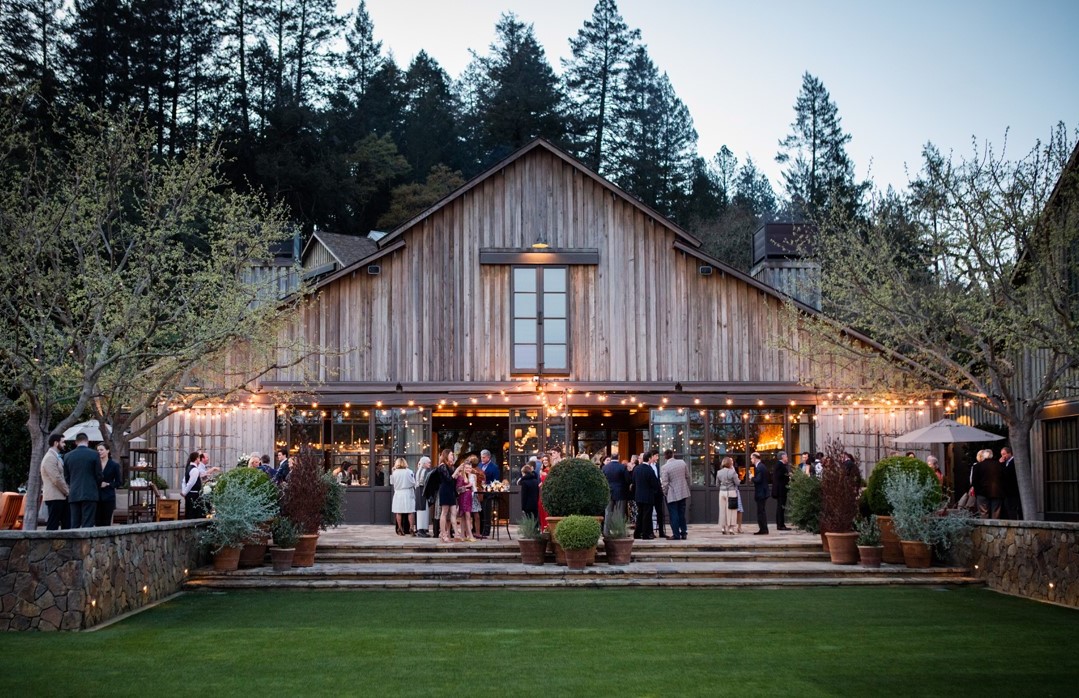
A reception at the Napa Valley Reserve
WH: I feel like they may recount that the first generation was able to identify the land, and able to put the elements together to form the foundation, and the second generation was really able to build on top of that and understand the character of the place, understand the latent identity of this place, and really was able to refine the translation of this into the wine so that by the end of our tenure, people see each one of these, Harlan Estate, Bond, Promontory, as really independently deserving of being at the table among the really fine wines of the world. And at the end of that fifty years in front of me, we will have had the benefit of having wines that are now 50,60,70 years old that can show, that can prove that not only are these compelling when they’re young, but they take on and can achieve these facets that we see in some of the old wines after some serious ageing.
AH: To add to that, I think really doubling down on having our internal organisation be somewhere that’s really committed to great human capital and flourishing in a lot of ways, and us being a place that people hope and dream that maybe they’ll also have children that will be inspired and want to also join our family business. So, those are the only other two little things I would probably add on that I would love to be remembered and recognised as our generation was part of.
LUX: Do you ever disagree about anything?
WH: In general; I might make the general statement that our family is fairly aligned in terms of feeling strongly that the direction and vision that we’re on is the right one. For instance, I don’t think there’s ever been a case where my dad and I were misaligned on the vision, maybe we disagree on how to get there, but we’re totally there on what the potential is, what the opportunity is, and where we feel we can take things. I think our default setpoint, even with Amanda and I, I think is that we’re pretty aligned. Amanda and I are very complementary in terms of our skillsets and the things that we can bring to the business, so I’ve at least never felt that competitive nature that could come and maybe misalign priorities or intent.
AH: I totally agree. I’ve always felt very grateful to have a brother that was really solidly great at all the gifts that weren’t bestowed upon me.
WH: And vice versa!
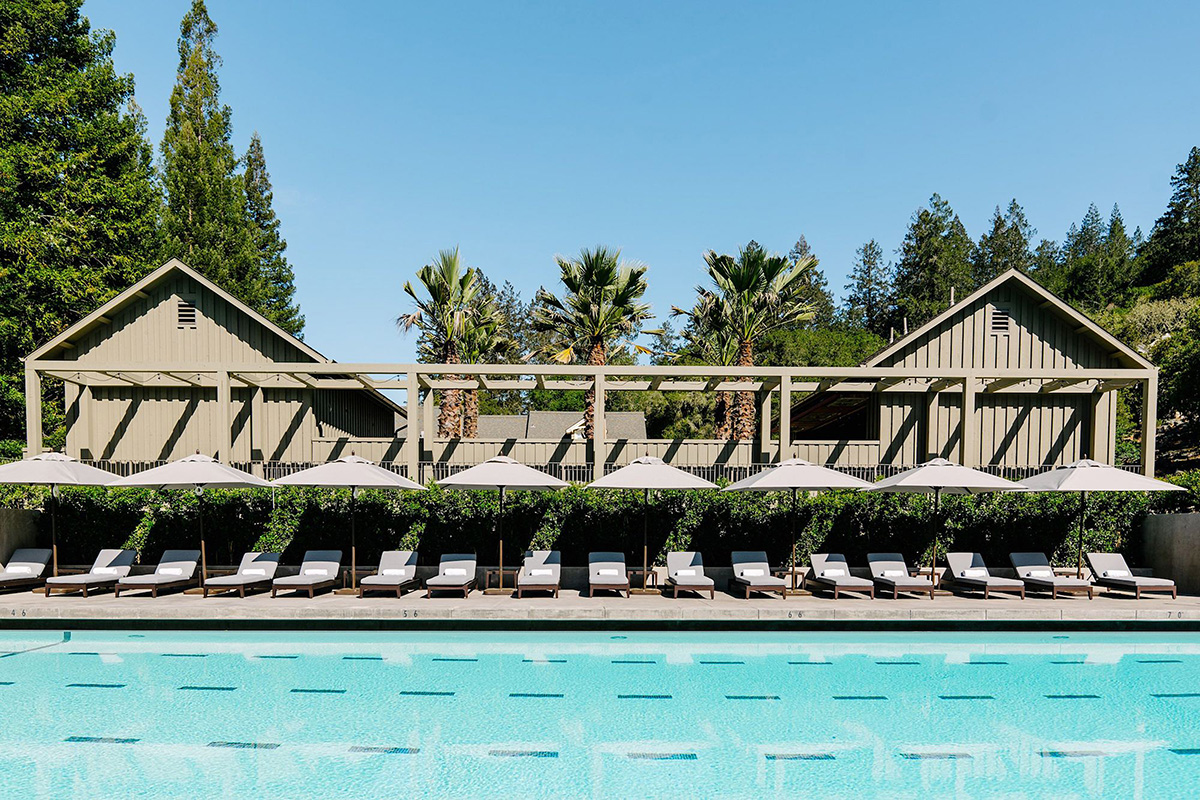
Meadowood Fitness Pool
LUX: What are those gifts? What are your complimentary skills?
AH: I mean, I feel very very grateful that I have a brother who is also very much like my father in being a visionary who also comes at life with a very philosophical view, who is very thoughtful and intelligent and brilliant, but is also not afraid to go beyond and dream big, but is also very fair and very kind and I think is very strategic, and able to be a problem solver in a way that I was never able to. But I think as a leader and someone who constantly has his finger on the pulse of what’s happening, globally, not just in the world of wine, but I think across many different platforms and fields, it is very settling for me knowing that someone, especially my brother, is able to see beyond the scope on which we are focused every day.
WH: Well first of all, thank you Amanda. And again, vice versa. Amanda’s natural setpoint of just being someone that cares deeply and can connect with people, I don’t care who it is on the planet, from celebrities and royalty, down to really pretty much anybody that she comes across. And connect in a very real, authentic, and caring way, and the relationships that she builds effortlessly, I think, are things that I’ve found myself oftentimes having to work very hard at. We have to engage and bring people into what we’re doing, not just from an intellectual standpoint but from an emotional standpoint, and there needs to be some connection on a human level, that comes to Amanda very naturally. She accomplishes at a very high level, but also very authentically and in a very caring way.
AH: Making me tear up over here Will. Thank you.
LUX: Is the focus then to take what you already have to another level?
WH: It certainly is from my perspective and the word focus, is really important, to me but also to where we are. In the evolution of our family business, we now have three wine growing endeavours here in Napa Valley: Harlan Estate, Bond, and Promontory, in addition to Meadowood and the Napa Valley Reserve. We have these three pillars, we founded each one of these in the same 25-year period of time, and I think we all feel and believe so strongly in the potential of each one of them. In that we are just barely scratching the surface today of the potential of each one.
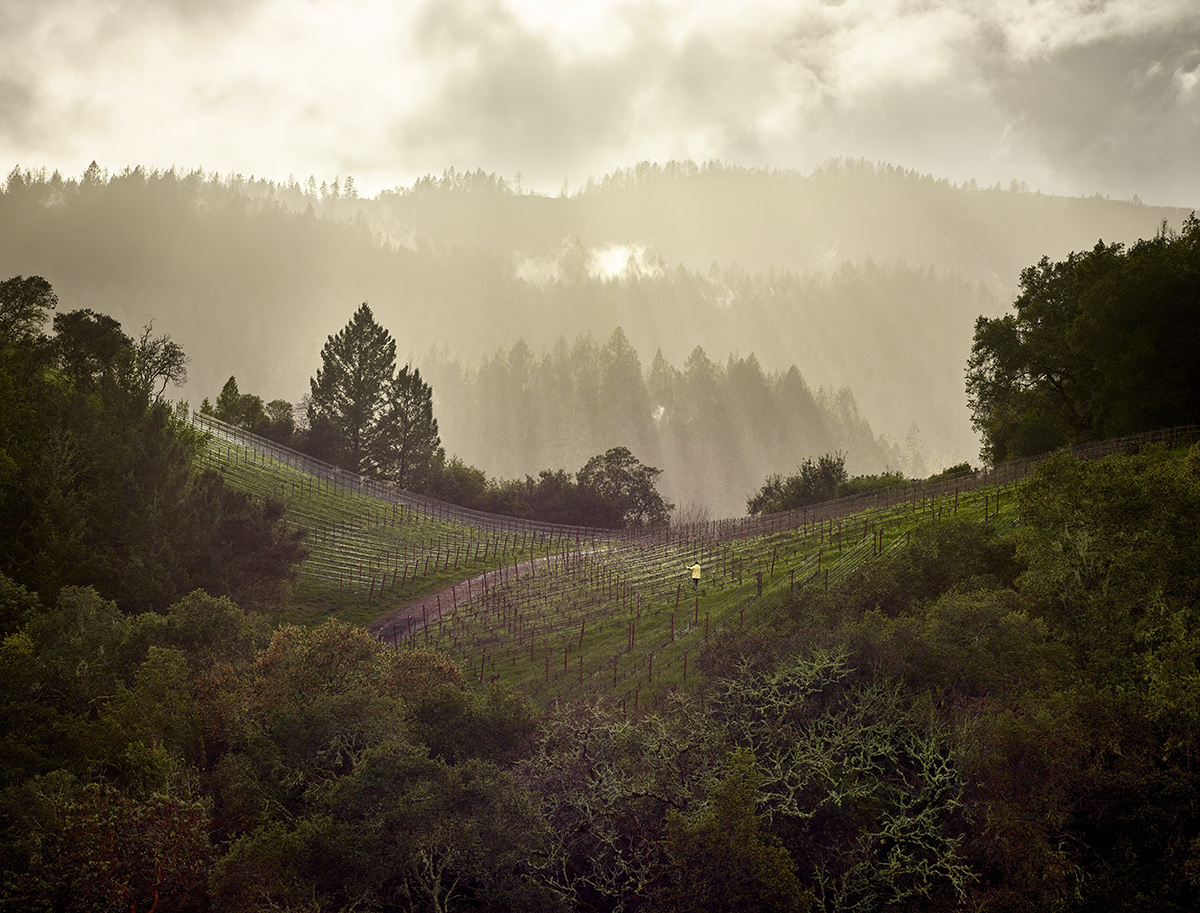
The vineyards at the Promontory property are set high in the hills amid wild woodlands
As we understand the land of each of them, really elevate our ability to translate the instinct and latent character of the land into the wine, we see a much more exciting and compelling potential by retaining a certain focus and going deeper and deeper and deeper and bringing our wines to the next level, next level, next level. That to us is more in line with our culture and our philosophy and our vision, rather than expanding the other direction, broadly and trying to grow more in size or in breadth, or in diversity of different business, ancillary or lateral moves. That’s how I look at it, but it’s not for lack of belief in potential, evolution, and growth. But the growth for us is more this deepening than size or breadth.
LUX: Amanda, you are responsible for Meadowood [the luxury resort] and also Napa Valley Reserve [the private members’ wine club and estate]?
AH: Indeed, it’s under one umbrella. We are diving deeper into the next iteration of what Meadowood is and will become, as well as the Napa Valley Reserve and the generational shift that is occurring.
LUX: And with Meadowood and Napa Valley Reserve, isn’t that a completely different business to making great wines? And is your membership becoming more international?
WH: Well, the Napa Valley Reserve has a wine growing element to it. We have vineyards, a winery, that’s part of the concept. In terms of membership, I would say about half of our new members that are coming in aren’t necessarily local members. We have a much broader group of folks that are interested in what we’re doing at the Napa Valley Reserve. So when they do come to Napa Valley, from, let’s say Hong Kong, once or twice a year, they are able to create tradition within their family and have their family come and spend time in the vineyard, really work closely with our team, creating their own blend and maybe tweaking it a little bit each time they’re here, year after year. We have a couple of events that are the pinnacles of bringing our membership together a couple of times a year.
Wanting to be closer to nature was accelerated during the pandemic, and I think creating new tradition within the 21st century has been a big part of bringing family together that may live all over the world, but come together a few times in the year, predominantly around flowering, when the vines are flowering, and then harvest time. So, I would definitely say that with the current international members we do have, we have had a huge upswing since the pandemic happened and folks really wanting to be closer to nature.
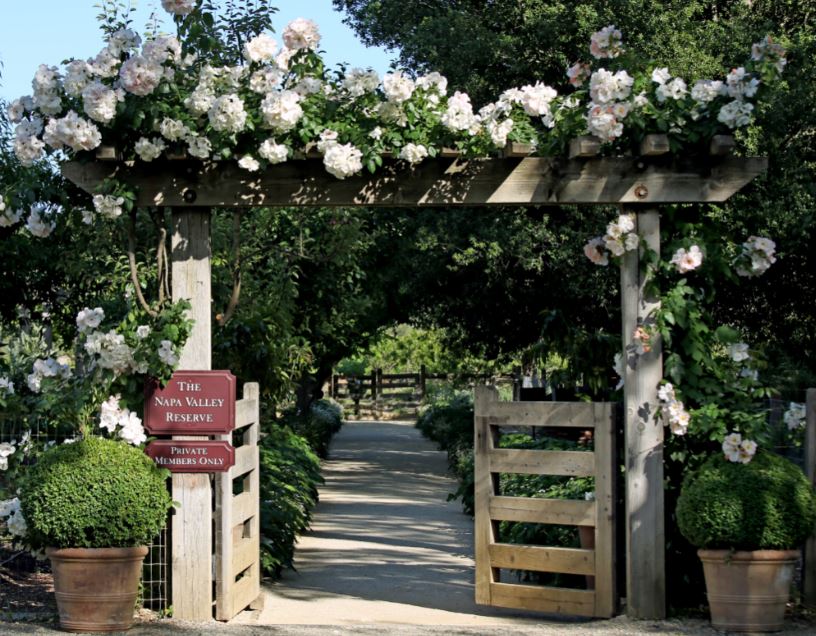
Napa Valley Reserve Entrance
LUX: With the wines – you could sell everything you produce several times over in the US alone. Yet you enjoy selling worldwide.
WH: From a very early age, we were brought up with this very long-term vision, this 200-year plan that my dad talked about quite a bit. Part of this is that we have got to think quite far down the road, oftentimes outside the span of our own lifetimes, which takes a while to get used to, really with the vision of feeling that, first of all Napa Valley, as a region has the potential to be considered among the fine wine regions of the world. We’re a younger region, but I think we’ve made some pretty good strides in that direction. And on top of that, the particular interest within the Napa Valley is identifying those plots of land that aren’t just of the highest quality, but have that very specific and differentiating and distinctive character, that we can produce wines ourselves that deserve to be among the finest in the world.
Read more: Lamberto Frescobaldi on 1000 years of tradition and wine
And I think in order to create the strongest foundation for this family business in the long run, we felt it was pretty important to have an international scope, not just from a business perspective, being able to be very diversified in our audience, but also in terms of credibility. There’s a huge amount of significance of being able to say that not only are we a great wine in America, but we can really gain this credibility with the international trade, critics, collectors, etc, and having that international presence that positioning outside our home market was really important as we build this very long term foundation, being considered really among the fine wines of the world.
LUX: Is there a snobbery among old world collectors, that they look down on wines from from Napa, or are we over that?
WH: No, of course you still find a little bit of that, and I don’t think that will ever totally go away. Maybe a hundred years from now it’s a little bit more economical, but no, I think there’s still a lot of work that we need to do, being out in the world, building relationships, telling our story, but more importantly showing the wines. Not necessarily just the wines from this year, but showing the wines that we made thirty years ago and showing that these can age and can actually develop and evolve into really elegant and compelling wines, that’s on us, we’ve got to be out there doing the work to build that understanding.
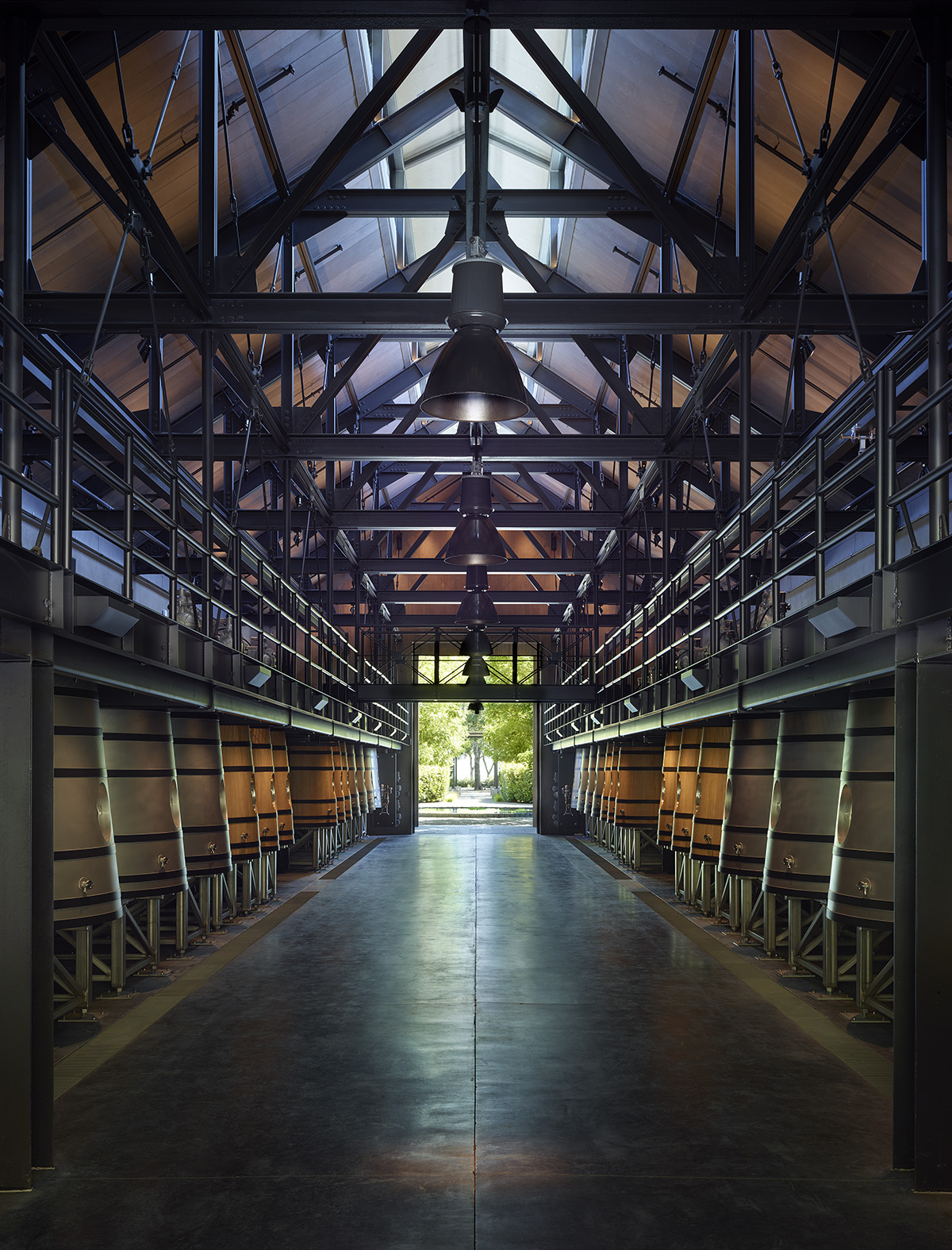
Promontory Fermentation Room
LUX: For me, Promontory is on a level with Chateau Cheval Blanc. But how do you achieve that sort of brand equity for Promontory when there isn’t that much of it around?
WH: We just need to be in the market, building these relationships internationally. What Cheval Blanc has that we don’t have is time. They’ve got a storied history. They’ve been doing this for multiples of the amount of time that we’ve been doing this, and so I think there’s just a market presence because of that historical awareness for Cheval Blanc, and at this point there’s a pretty big delta between that and us. Can we diminish that gap, of course. That’s what we’re going to be trying to do, that’s what time on its own will do, I don’t think we can circumvent that completely. Even just to be mentioned in the same realm as some of these great wines of the world, for us is inspiring, and it feels like an honour to be considered among these.
Find out more:

